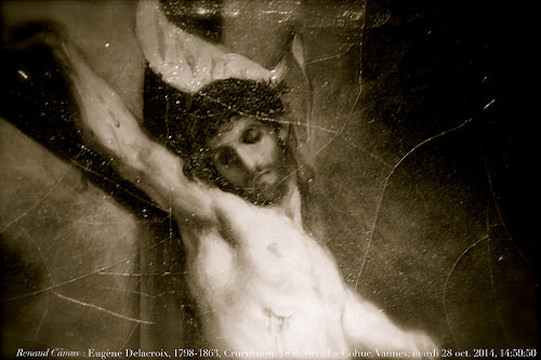We run our website the way we wished the whole internet worked: we provide high quality original content with no ads. We are funded solely by your direct support. Please consider supporting this project.

Love and Violence
What does it mean to confess that “God is love” and that we are called to “live in love” (Eph. 5:2)? One of the more common ways of understanding God’s love has its roots in the teachings of Augustine. He adamantly affirmed that the revelation that “God is love” lies at heart of the Gospel and is foundational for Christian theology and ethics. This conviction is reflected in Augustine’s famous hermeneutical “rule of love,” which in essence stipulates that “scripture enjoins nothing but love.” Hence, every passage “should be studied with careful consideration until its interpretation can be connected with the realm of love,” by which Augustine means the building up of our love for God and neighbors.
However, Augustine defined love as an inner disposition that had no necessary behavioral implications. For example, speaking of Jesus’ command to never retaliate but to rather “turn the other cheek” (Mt 5:39), Augustine argued; “what is here required is not a bodily action, but an inward disposition.” Augustine thus argued that one could love one’s enemy while nevertheless treating them with “benevolent severity.” More specifically, for God as well as humans, loving enemies did not necessarily rule out torturing and killing them if one was justified in doing so. Augustine went so far as to use Jesus’ parable of the royal banquet in which servants are told to “compel” people to come (Lk 14:16-24) to justify the use of coercive force, and violence if necessary, to “compel” heretics like the Donatists and Manicheans to repent, all in the name of love. Tragically, Augustine’s unprecedented use of this parable provided the Christian tradition with a ready proof-text by which it justified such activity throughout the centuries that followed.
It is hard not to empathize with Augustine and other ecclesial leaders in the fourth and early fifth centuries as they faced the unenviable challenge of trying to reconcile the NT’s teaching on love and non-violence with the practical realities the church faced once it accepted the political power Constantine bestowed on it. Nevertheless, the NT doesn’t leave us in the dark as it concerns the definition of love. To the contrary, it goes beyond providing a definition: it points us to love’s supreme illustration. “This is how we know what love is,” John says, “Jesus Christ laid down his life for us.” From this he concludes, “we ought to lay down our lives for one another“ (1 Jn 3:16, emphasis added). When John proclaims that “God is love,” this is the kind of love he is referring to. He is saying nothing less than that God is the kind of love that causes God to set aside his blessed state, to humble himself by becoming a human being, to offer himself up to be humiliated, tortured and crucified, to fully identify with our sin and our curse, and to therefore fully take upon himself the abandonment of God that we deserved—all for our sake while we were yet sinners and enemies of God (Rom 5:8-10)!
The depth of love one has for a beloved can be measured by the sacrifice the lover is willing to make for the beloved. In this light, consider the fact that on the cross, God went to the furthest extreme possible out of love for a race of people who could not have deserved it less. I say “furthest extreme possible” because on the cross, the all-holy God stooped to become our sin (2 Cor 5:21), and the God whose very essence is a perfect, eternal unity of love stooped to become our God-forsaken curse (Gal 3:13; Mt 27:46). In other words, on the cross, God entered into the nightmare of becoming his own antithesis out of love for us.
By definition, therefore, God could not have gone to a further extreme, could not have stooped further, and could not have sacrificed more, than he did on the cross. And it is the unsurpassable extremity to which God condescended for this undeserving race that reveals the unsurpassable perfection of the love that God eternally is, and therefore the love that God has for us. It is for this reason that I claim that the logic inherent in God’s self-revelation on the cross necessitates that we accept it as the unsurpassable revelation of God. We cannot understand the cross properly without understanding it in this way.
To borrow a phrase from Anselm’s ontological argument, we might say that the cross is that revelation beyond which none greater can be conceived. Hence, while everything Jesus said and did revealed God, the cross must be considered the quintessential expression of the character of the God who was revealed in everything Jesus said and did. Hence I submit that God’s self-sacrificial, loving nature is the thematic center of Jesus’ mission.
Image by Renaud Camus via Flickr
Category: General
Tags: Augustine, Cruciform Theology, God is Love, Violence
Related Reading

Benefit of the Doubt Is Here!
Benefit of the Doubt is finally here and you should definitely get yourself a copy! Frank Viola interviewed Greg about the book recently and you can read it over on Frank’s blog Beyond Evangelical. In fact, Frank is so enthusiastic about the book that he added it to his Best 100 Christian Books Ever Written list. Wow. Also,…

A Cruciform Magic Eye
In this post I’d like to share the story of how I came upon the thesis I’m defending in the book I’ve been working on for the last four years entitled The Crucifixion of the Warrior God: A Cruciform Theological Interpretation of the Old Testament’s Violent Divine Portraits. It’s a much longer post than usual,…

Podcast: Where Does Forgiveness Fit in a Cruciform Theology?
Greg offers looks at forgiveness in a realm of natural consequences. http://traffic.libsyn.com/askgregboyd/Episode_0298.mp3

Jesus Said, “Buy a sword.” What did he mean?
Yesterday, I challenged the common assumption that Jesus was violent when he drove out the animals and turned over tables in the Temple courts. (See post.) Today I want to look at the second episode some site to suggest Jesus wasn’t totally opposed to violence. It takes place just before Jesus and his disciples leave…

Can Christians serve in the military?
Question: Jesus ministered to military people (e.g. a centurion) and didn’t tell them to leave their military post. So do you think Christians can serve in the military? I believe it’s a Christians duty is to serve their country, aid the wounded, defend the oppressed, protect our families, stand for truth and justice, and kill…

Podcast: Is Holiness an Essential Part of God?
Greg looks at the relationship between love and justice. http://traffic.libsyn.com/askgregboyd/Episode_0428.mp3
